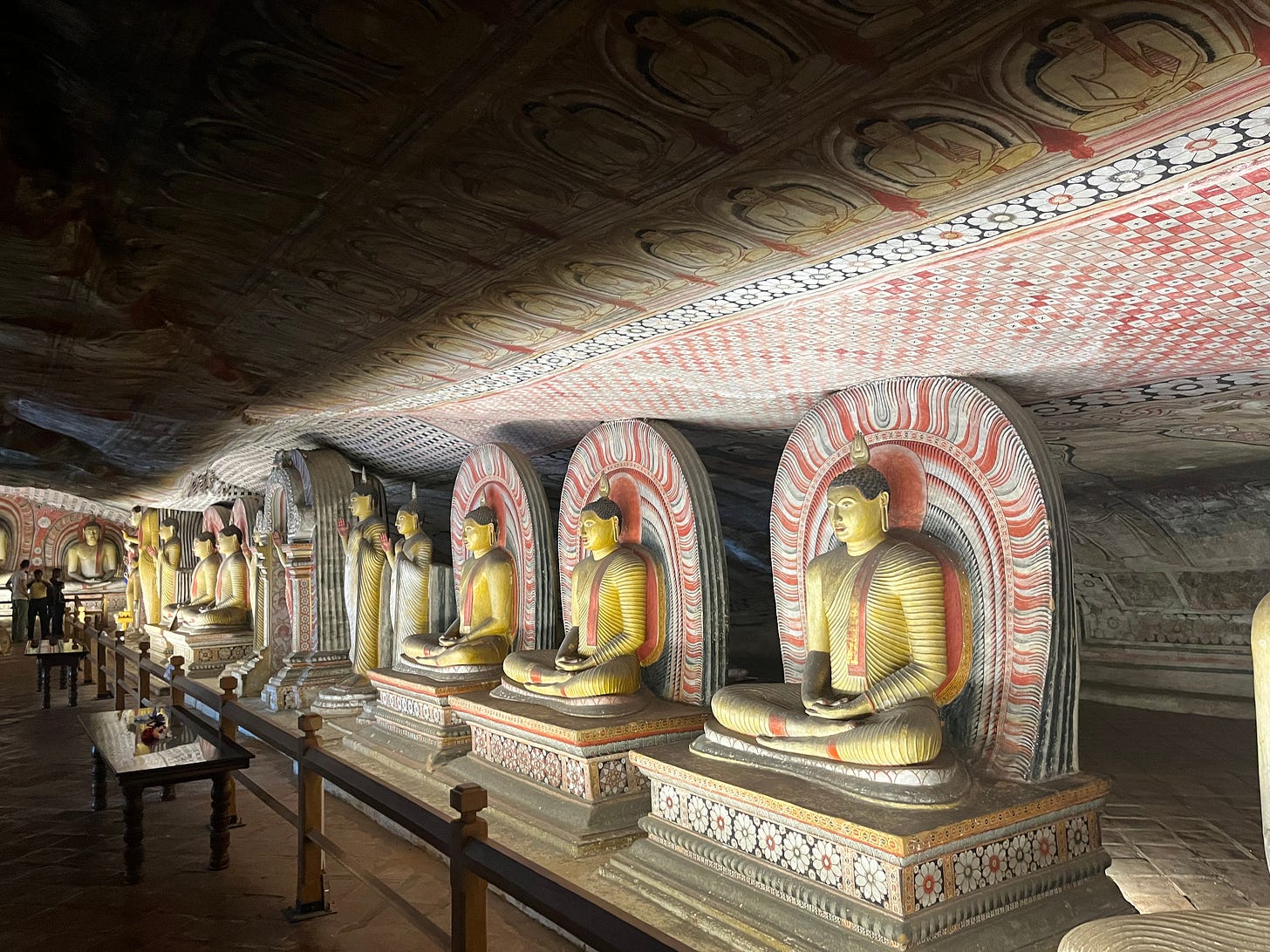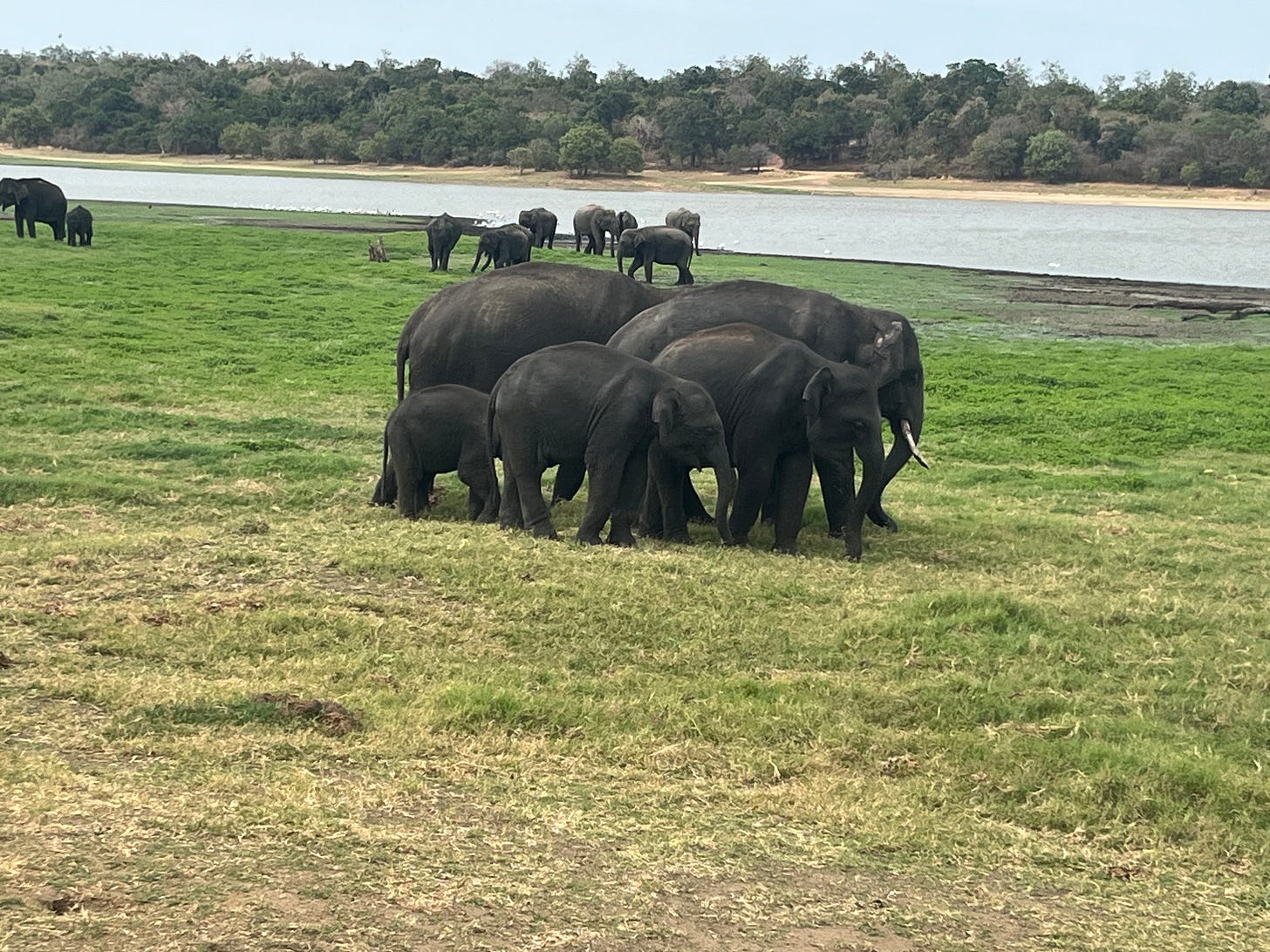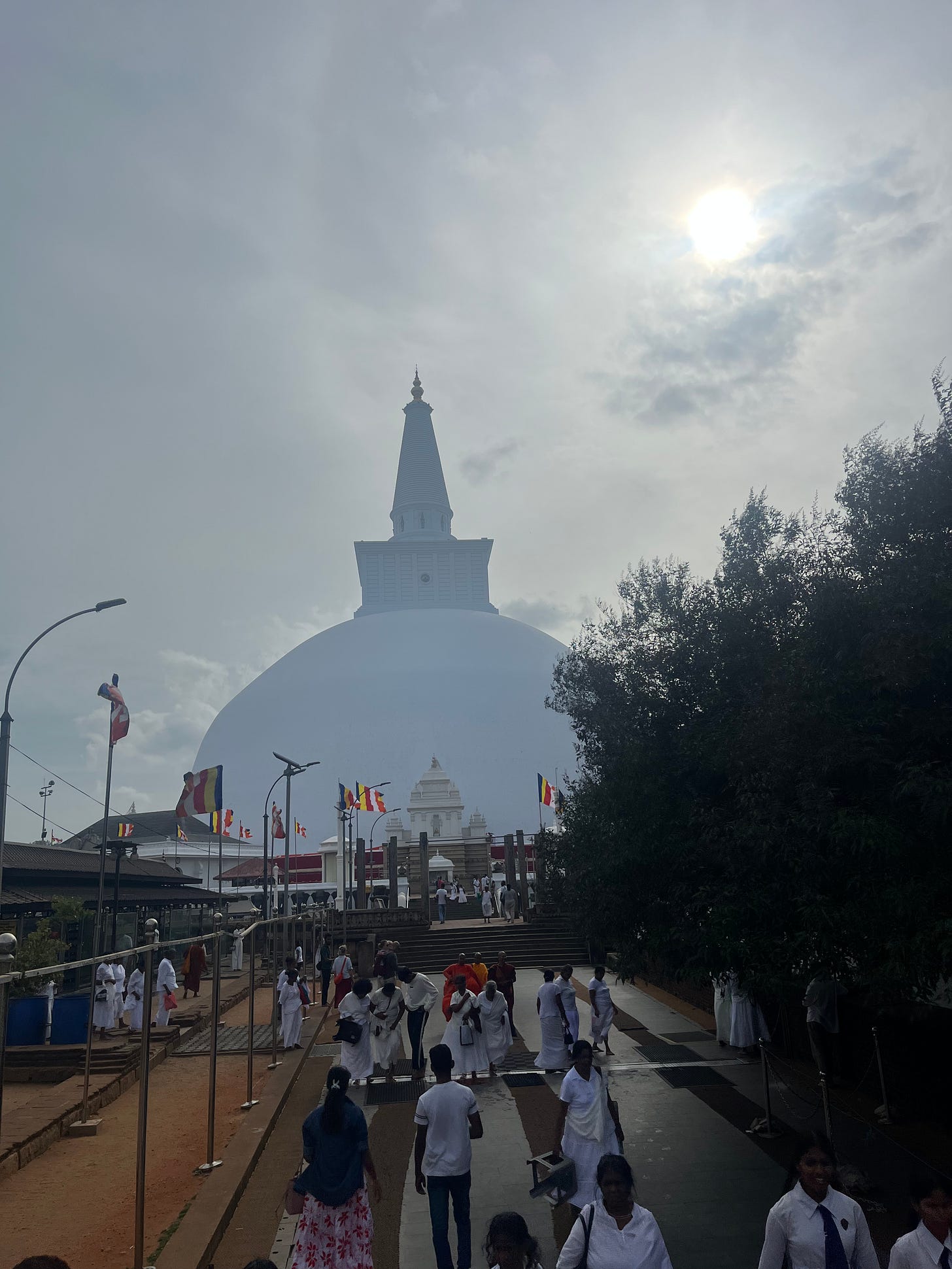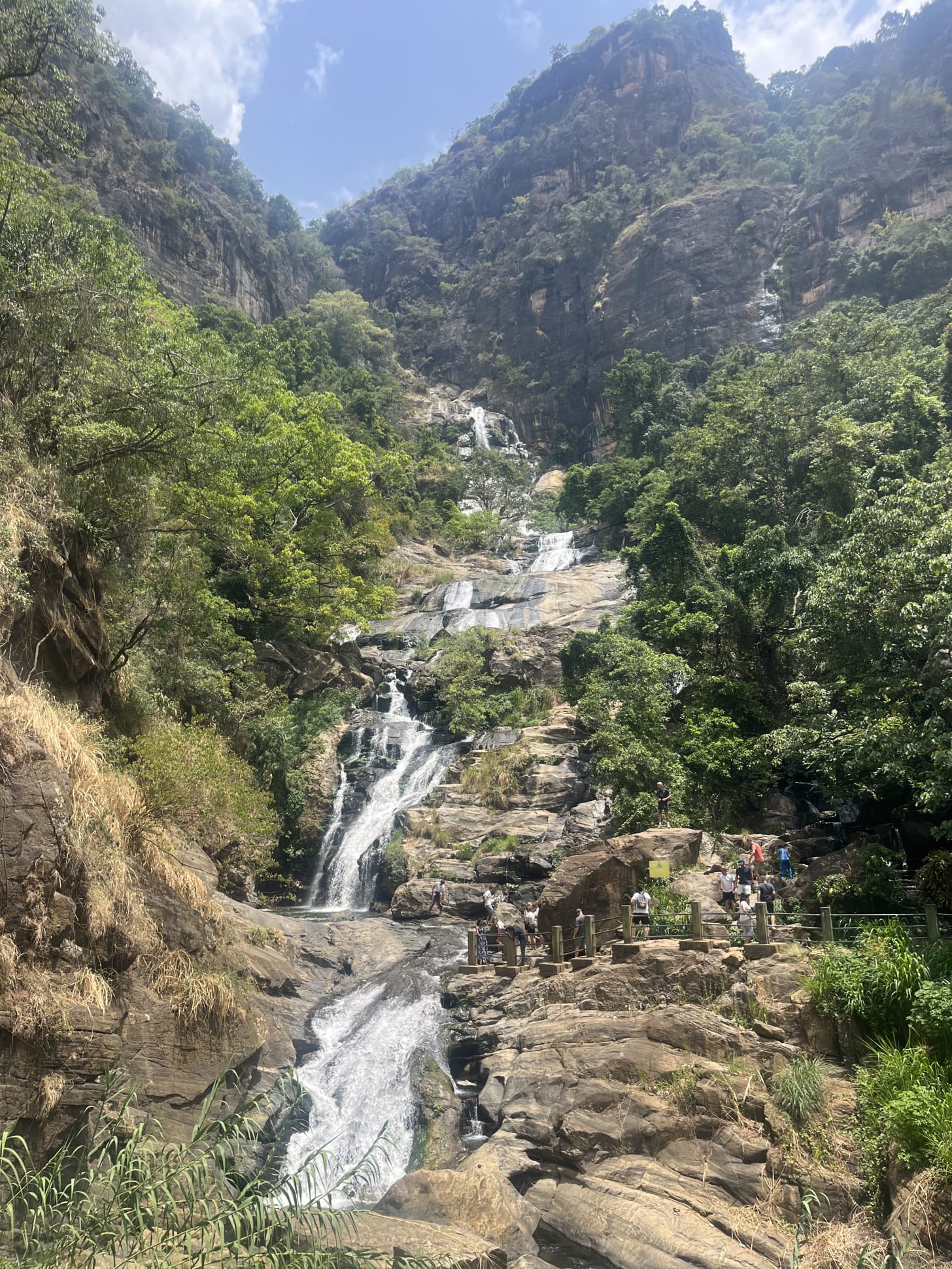The joys of touristing
Discovering myself while travelling around Asia, yah
I have a vivid early memory of being in a taxi late at night with my parents and brother, half-asleep and on the way back from the airport. We had been away for a long time, I don’t even know where, and I can recall a strong feelings of happiness and comfort as the visual surroundings became more familiar, closer to that beautiful thing called home. It’s probably the most powerful holiday memory I have.
Travel is an investment in memories; new and sometimes unsettling settings are retained by our brains far more than the familiar, which can be of great value in later life, since we recall these moments fondly even if we weren’t especially relaxed at the time. This is at least one reason we have twice taken our children on adventurous and unfamiliar holidays, most recently to Sri Lanka, despite not being in the salary bracket that can really justify this (never again). Obviously, that’s just an excuse – we selfishly want to go ourselves. They’d rather spend a week in Dorset, but sorry kids, this is the least harmful way that daddy can live out his mid-life crisis, so we’re off backpacking in Asia.
I love travelling, despite not enjoying the most practical method of getting there. Lockdown implanted a strong desire to see more of the world; each night I’d put my son to bed, having barely left my postcode for weeks, and we looked at the huge map above his bed and I’d talk about a country and what it was like. And every night I thought about all the distant places I’d like to see, and how little I had: in my teens and early twenties I was too neurotic; after that I was too poor. I’ve probably done more travelling in the past four years than the previous forty, and I am far from alone in the post-pandemic age of restlessness.
Despite the mood of international pessimism, the number of people travelling the world keep on going up, with figures recovering pre-Covid levels last year, and expected to surpass them in 2025. Southern Europe, where the modern travel industry really began with wandering British aristocrats steeped in classical culture, is more popular than ever. Asian countries like Vietnam are expecting record numbers, too.
As travel has grown more popular, so the reaction against it has grown stronger, too. Agnes Callard made a good case against travel a couple of years ago, quoting some of the great haters of the ages, including Portuguese writer Fernando Pessoa, who wrote in his Book of Disquiet that: ‘I abhor new ways of life and unfamiliar places…. The idea of travelling nauseates me… Ah, let those who don’t exist travel!… Travel is for those who cannot feel… Only extreme poverty of the imagination justifies having to move around to feel.’
Many would today agree, and Callard wrote that: ‘If you are inclined to dismiss this as contrarian posturing, try shifting the object of your thought from your own travel to that of others. At home or abroad, one tends to avoid “touristy” activities. “Tourism” is what we call travelling when other people are doing it. And, although people like to talk about their travels, few of us like to listen to them. Such talk resembles academic writing and reports of dreams: forms of communication driven more by the needs of the producer than the consumer.’
She noted the difference between a traveller and a tourist, quoting the academic volume Hosts and Guests which defined the latter as ‘a temporarily leisured person who voluntarily visits a place away from home for the purpose of experiencing a change.’ Much of this, Callard pointed out, was a fantasy.
‘For example, a decade ago, when I was in Abu Dhabi, I went on a guided tour of a falcon hospital. I took a photo with a falcon on my arm. I have no interest in falconry or falcons, and a generalized dislike of encounters with nonhuman animals. But the falcon hospital was one of the answers to the question, “What does one do in Abu Dhabi?” So I went.
‘The single most important fact about tourism is this: we already know what we will be like when we return. A vacation is not like immigrating to a foreign country, or matriculating at a university, or starting a new job, or falling in love. We embark on those pursuits with the trepidation of one who enters a tunnel not knowing who she will be when she walks out. The traveller departs confident that she will come back with the same basic interests, political beliefs, and living arrangements. Travel is a boomerang. It drops you right where you started.’
That is probably true. The Critic writer Will Solfiac pointed out that: ‘People don't travel to learn about a country, they travel to relive memes they've got from the culture at large. So they go to Paris for romance and luxury, and to India for spiritual poverty.’ Tourism is buying into a dream, a fantasy that Britain doesn’t really exploit enough, and I’m personally happy to be a tourist rather than a traveller.
I admire the Spirit of the Anglo, that sense of adventure and curiosity which drove the British from the 16th to the 20th centuries, epitomised by Stephen Maturin in Patrick O’Brian’s novels - always enquiring, always learning, always categorising. Those people still exist: Alice Evans buries herself in foreign cultures and sees them red in tooth and claw. I just personally couldn’t do that myself; I’m too neurotic and would spent my time worrying about catching rabies.
In recent years anti-tourism protests have arisen in Spain, especially in Barcelona, which is overrun by visitors. This is understandable, considering Airbnb’s effect on the housing market, although I find the phrase ‘tourists go home’ rather amusing – that is what tourists do, by definition.
People are often anti-tourism in the tradition of being anti-bourgeoise and anti-gentrification. It’s a status competition. Of course, mass tourism does destroy the thing it loves, including perhaps the environment, and it is not a coincidence that climate protests are dominated by the social class who do the vast majority of flying. When environmental activists demand that their trial be postponed to avoid ruining a holiday to India, it does rather epitomise all our most cynical thoughts about the sort of people who like travelling.
Travelling also attracts resentment because it is a status game. This goes back as far as the 15th century, when international silk merchant Gregorio Dati commented that ‘A Florentine who is not a merchant, who has not travelled through the world, seeing foreign nations and peoples and then returned to Florence with some wealth, is a man who enjoys no esteem whatsoever’.
Similarly, Callard quoted Samuel Johnson’s advice to James Boswell that he should visit China because it would bring prestige to his children: ‘There would be a lustre reflected upon them. They would be at all times regarded as the children of a man who had gone to view the wall of China.’
That is still true today, one reason why any tourist experience will be dominated by the ubiquitous smartphone. Status competition is surely why most people post pictures of foreign travel on Instagram - to boast, and so to make others jealous and feel worse about themselves. That’s certainly why I do it. No one is actually interested surely, anymore than they’re interested in hearing their friends’ gap year stories about south-east Asia.
Travelling has also become linked to a form of introspection which is essentially quite empty. It seems unfair and a sweeping stereotype – heaven forbid I would be guilty of such a thing – but the people you meet who are ‘travelling’ for long periods often seem a bit flat. Perhaps dull people are more likely to travel the world because they feel they must arm themselves with experiences, or their minds grow less sharp because they’re not exercising their mental muscles in the rat race.
Another reason for the new-found hate, at least in Elon-era Twitter, is that travelling has become more female-coded. There are many possible explanations for this trend, one being the popularity of the memoir and film Eat, Pray, Love, although greater safety is surely the largest factor; Alice Evans certainly thinks so and points to the critical role of the smartphone.
What travel and smartphones also have in common is that they probably contribute to still further downward trends in fertility. Travel is anti-natal because the two things are largely incompatible; although some brave spirits do try trekking in the Andes with their pre-schoolers, my personal experience is that going anywhere abroad with young children is often more hassle than it’s worth. The desire for travel reflects an anxiety about maximising experience in our short lives that many people feel is impossible with a pram in the hall. I’ve heard of men leaving committed relationships and the prospect of raising a family because they wanted to go travelling and ‘discover themselves’, well into their thirties when I suspect there isn’t that much more to discover.
Now that our children are secondary school age, this is much less of an issue and indeed they’re more like fellow travellers to share outlandish experiences with: watching herds of elephants, hanging out of the Kandy to Ella train, or releasing baby turtles into the Indian Ocean; anyway, you probably have to be there.
There is still much of the world I long to see; I’d love to visit Moscow and St Petersburg, and even take the Trans-Siberian railway, although it doesn’t feel like Russia is going to happen anytime soon. Similarly, with the train from Tehran down to Shiraz and Persepolis.
There may well be time in the future, and it’s never too late to start. Samuel Johnson didn’t leave England until his early sixties, first travelling to the Hebrides and then, two years later, visiting France. In his typically Tory way, he concluded that ‘What I gained by being in France was, learning to be better satisfied with my own country’.
That is a common feeling, and despite seeing leopards and crocodiles, and enjoying the kindness and warmth of Sri Lankans, our children seem better satisfied with their own country afterwards. As the holiday went on, the youngest fantasised about walking on Hampstead Heath with his grandparents. Child number two longed for plain British food. The eldest just wanted a respite from the sun. They all looked forward to seeing their friends. Perhaps they will, like me as a young child, best remember coming home.
The morning after arriving in London I went to my local Sainsbury’s; within five minutes two different people had said sorry for coming vaguely close to my personal space. It’s good to be back in England.






Many years ago a couple of things put me off travel. The first was when I was cycling along the coast of Ireland. I stopped at a place that I knew must be of interest because several tourist buses had pulled up in the car park. I stopped, locked up my bike and went closer to hear what the guide was saying to his charges, a group of elderly Japanese or Chinese tourists, mainly ladies. He was pointing towards the sea and particularly to a bay, saying that this is where Tristan and Isolde had done...something. I didn't hear what. I was too busy looking at the Japanese ladies quietly talking to each other, either unable to understand the guide or not interested. And why should they be? They had probably never heard of Tristan and Isolde and while I did know the names, that was all I knew. This made me wonder why I too visited cathedrals and churches and the houses that famous people had lived in, despite not really being very interested in them. I was much more like Philip Larkin's cyclist in his poem Church-going, who stops simply because he's bored.
The second thing happened 5 years later when I was living in San Sebastian in the Basque region of Spain. It was a beautiful tourist destination but on rainy days, of which there were many, there was very little to do in that town. Then I would see families with morose teenagers wandering the streets in their raingear, arguing about what to do next and generally getting on each others nerves. Another cup of coffee? Another Pintxo? Walk back along the grey seafront to the hotel? Since then I have pretty much stopped going on holiday. Instead I visit friends dotted around places where I have previously lived.
I genuinely wish I was more interested in the world and I love it when my Japanese students reel off all the places they want to visit when they have enough money to do so. It reminds me of the young protagonists in Joseph Conrad stories for whom the mere mention of the term 'the East' conjures up the magic and romance of far-off places. Nowadays, in my own mind, all that is conjured up is the feeling travel sickness on coaches, killing time waiting for the rain to stop and asking myself why I never learn that brochures OF COURSE don't include photos of ring roads and industrial estates.
When the people of the Eastern Bloc countries were first able to travel outside the Bloc in the early 1990's I often met groups of young East Germans and such taking advantage of the new ability to travel abroad. They were so enthusiastic that it made me feel a bit dead inside. Why didn't I travel more? I concluded it was because, unlike them, I had always been able to, thus lessening the thrill. I'm sure that, had I been in their place, I too would have spent endless nights dreaming of distant places I wanted to visit, if only I could.
I have a friend who is quite happy to go on holiday alone. She goes to all the tourist places and is perfectly happy. But when I see people sightseeing alone, especially women, I feel sad.
Well, this is a return to the familiar dour form! I think it's all a little harsh. Although I recognise some of the arguments against travel, I think every case is overstated.
Travel is memorable, and a holiday in Sri Lanka is probably more memorable than one in Dorset. I think it's worth giving your children memories. Kids probably don't spend enough social time with their parents now with the distractions of social media. Granted, flying across the world is an expensive way to get them off their phones.
I think some of the complaints about travel are purely status-driven. If you can't travel more than other people, brow beat them into travelling less, so your status is restored. Does anyone travel in order to "feel"? I get strong straw man vibes here, coupled with "It's just not my scene, man." (One for the oldies. Ah, YouTube https://youtu.be/v9FsEi2us88?si=LJuKtXrbA__w3hCj )
"The traveller departs confident that she will come back with the same basic interests, political beliefs, and living arrangements. Travel is a boomerang. It drops you right where you started."
I don't think this is true. It wasn't true for me. It might drop you back, but in a slightly different place. Just one day visiting East Berlin dispelled any illusions I ever had of supporting Communism.
"I’ve heard of men leaving committed relationships and the prospect of raising a family because they wanted to go travelling and ‘discover themselves’, well into their thirties when I suspect there isn’t that much more to discover." Come on, this is nothing to do with travel; this is a pretext. People need constant new experiences. Perhaps a good marriage is essentially a new experience every day, and a bad one is the same one repeated. (There's probably an aphorism there, if I had the time, and inclination, to polish it.) And it worked for Paul Gauguin. (Shame I no longer have a reason to visit Edinburgh, because I would like to see his paintings there again.)
Agnes Callard has no interest in falcons, but this is somewhat Green Eggs and Ham-ish—you don't know until you've tried. At risk of being even more of a pain that I usually am, there is a mindful way of doing this, and it sounds like she wasn't. There's a small chance that you do this, then go home and relive "Kes" apart from the bird being killed. You probably won't, but you'll know something about yourself you didn't before. Personal growth, man.